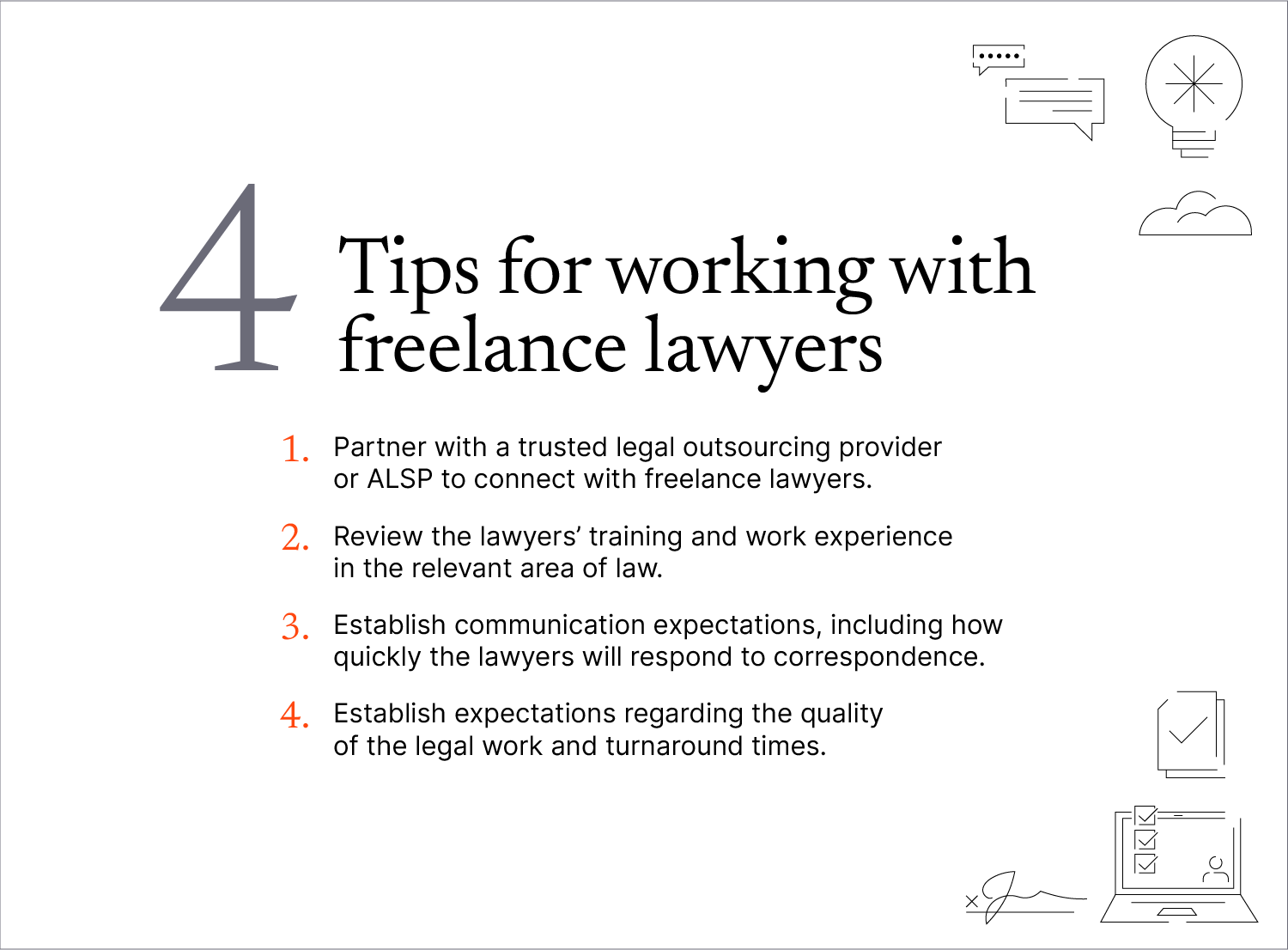Freelance lawyers are often a cost-effective alternative to hiring outside counsel or overburdening in-house legal teams with high-volume legal work.
The rise of the “freelance lawyer” corresponds with the growing popularity of alternative legal service providers and other gig economy platforms, which act as middlemen between lawyers and clients. Lawyers who work through an ALSP, often a legal technology provider, perform legal services for the ALSP’s customers. For example, lawyers in Ontra’s global Legal Network, the global leader in contract automation and intelligence solutions, work with some of the top asset managers in the world.
Traditionally, companies either hired in-house lawyers, temporary legal staff, or an outside law firm to handle repetitive legal tasks. However, it’s difficult to scale in-house staff up or down based on fluctuating workloads, and hiring temporary legal services could be costly and lead to low-quality results. While hiring outside counsel provides better results, it also incurs significant costs.
Utilizing freelance lawyers through the newest generation of legal services and human-in-the-loop technology is the middle ground between those two options. With the right legal technology provider, businesses can access high-quality legal services for a period of time without the cost of a BigLaw firm or hiring more in-house lawyers.
How are freelance lawyers different from traditional law firm lawyers?
Freelance lawyers are not employees of large law firms. They are typically solo practitioners or own small boutique law firms. They can work with numerous clients simultaneously, as they would at a large law firm. They might exclusively work with clients they obtain through an ALSP or platform or find clients through their private practice.
An important distinction is the type of clients freelance lawyers represent. Solo practitioners and small firms typically work with non-legal clients, while freelance lawyers work with other lawyers, in-house legal departments, or ALSPs. Because companies typically don’t hire freelance lawyers directly and, instead, go through an ALSP or other platform, this arrangement is known as legal outsourcing or legal process outsourcing.
What do freelance lawyers do?
Freelance lawyers, also called contract lawyers, provide services on a contract basis. They often offer legal services similar to those they provide in private practice or based on prior work experience. Contract lawyers fulfill defined legal services either for a set period of time or on an ongoing basis, such as negotiating contracts, drafting pleadings, reviewing documents related to litigation, or attending routine court appearances.
Can freelance lawyers work online?
Yes, many freelance lawyers work remotely and correspond with their clients via email, phone, and video calls. Another distinction between freelance lawyers and traditional law firms is that freelancers have greater flexibility when and where they work. Many of them work from home or in coworking spaces.
How can asset managers benefit by using freelance lawyers?
Using freelance lawyers with a legal technology solution can eliminate the pain points associated with keeping high-volume legal tasks in-house or hiring outside counsel. Contract lawyers coupled with legal tech can provide better results faster and for less cost than outside counsel.
Ontra offers HITL technology for negotiating and managing routine agreements by combining a virtual network of experienced lawyers with best-in-class, cloud-based technology. The result is an efficient, high-quality solution that saves asset managers time, frees up their internal resources, and substantially reduces their outside legal costs.
When should asset managers hire freelance lawyers?
Asset management firms should periodically review how they manage repetitive legal work. In many cases, firms keep high-volume, routine contracts, such as non-disclosure agreements, in-house.
Because their general counsel can’t manage the workload efficiently, GCs often assign routine contracts to deal professionals, who must negotiate and execute these agreements without a formal legal education. Additionally, many firms lack predefined terms and contract playbooks, which would give deal professionals much-needed guidance.
Asset managers should research legal outsourcing services when they realize the need to free up their in-house lawyers’ and deal professionals’ time. An ALSP like Ontra was built to handle high volumes of NDAs and other routine agreements on behalf of its customers. More importantly, Ontra works closely with asset managers to create contract-specific playbooks and leverages machine learning and in-depth industry knowledge to automate parts of the contracting workflow.

How can firms find the best contract lawyers?
Asset managers can find the best freelance lawyer by seeking the right legal technology provider or ALSP. For example, asset managers burdened by NDAs and other routine agreements can find the right legal services with a contract automation solution provider.
Ontra’s Contract Automation solution combines AI-driven technology with a global network of freelance lawyers. Our legal network members have negotiated over 800,000 contracts for our customers, including some of the largest asset managers in the world.
What’s ahead for corporations and freelance lawyers?
The career path for corporate lawyers hasn’t changed for many years, with few options available to lawyers interested in pursuing opportunities outside of the traditional law firm environment. However, as the gig economy and alternative legal services continue gaining traction, the legal industry and corporations will see more lawyers go the freelance route.
This blog was originally published on November 15, 2018.



